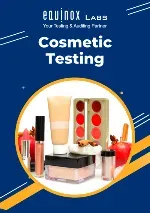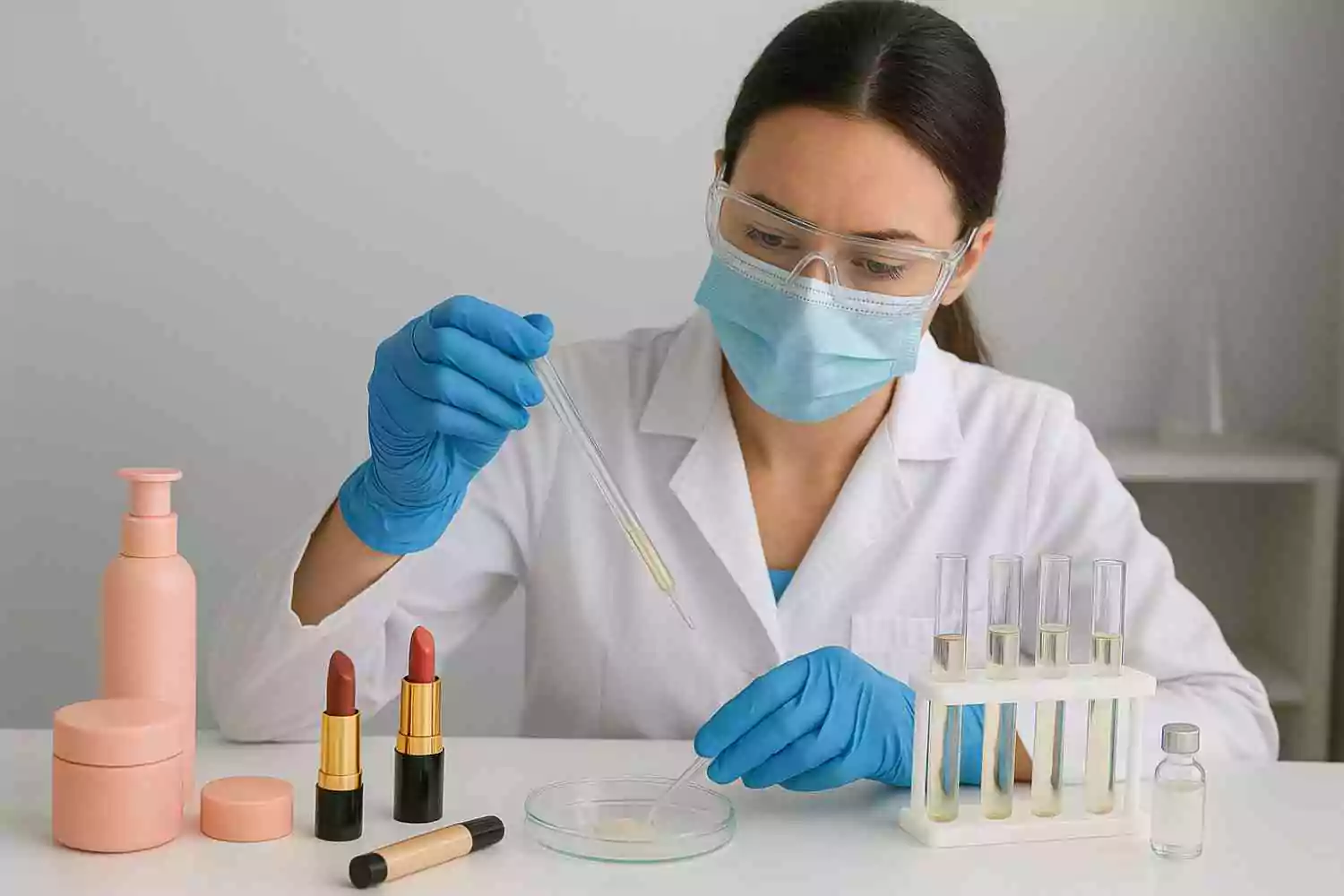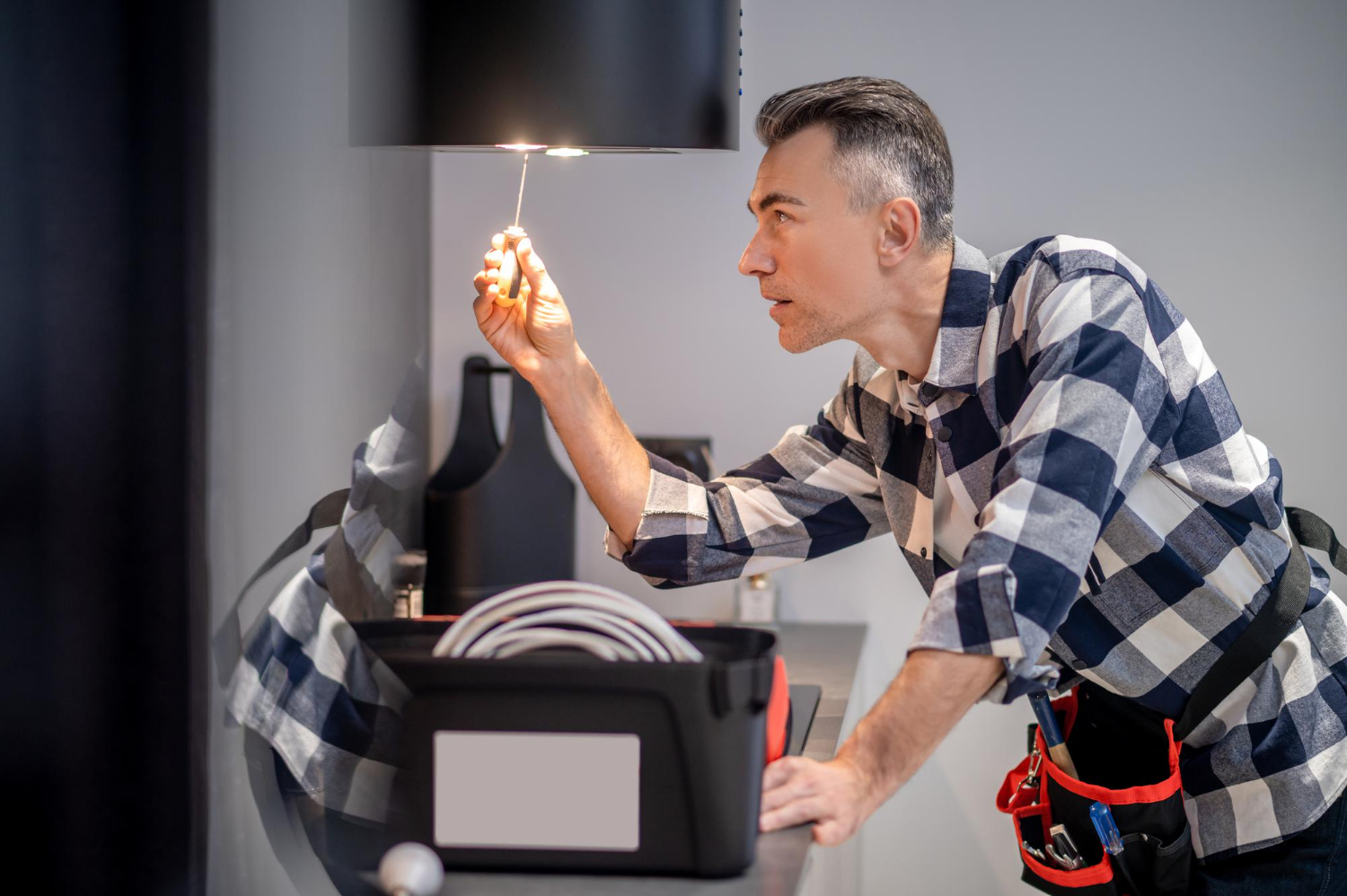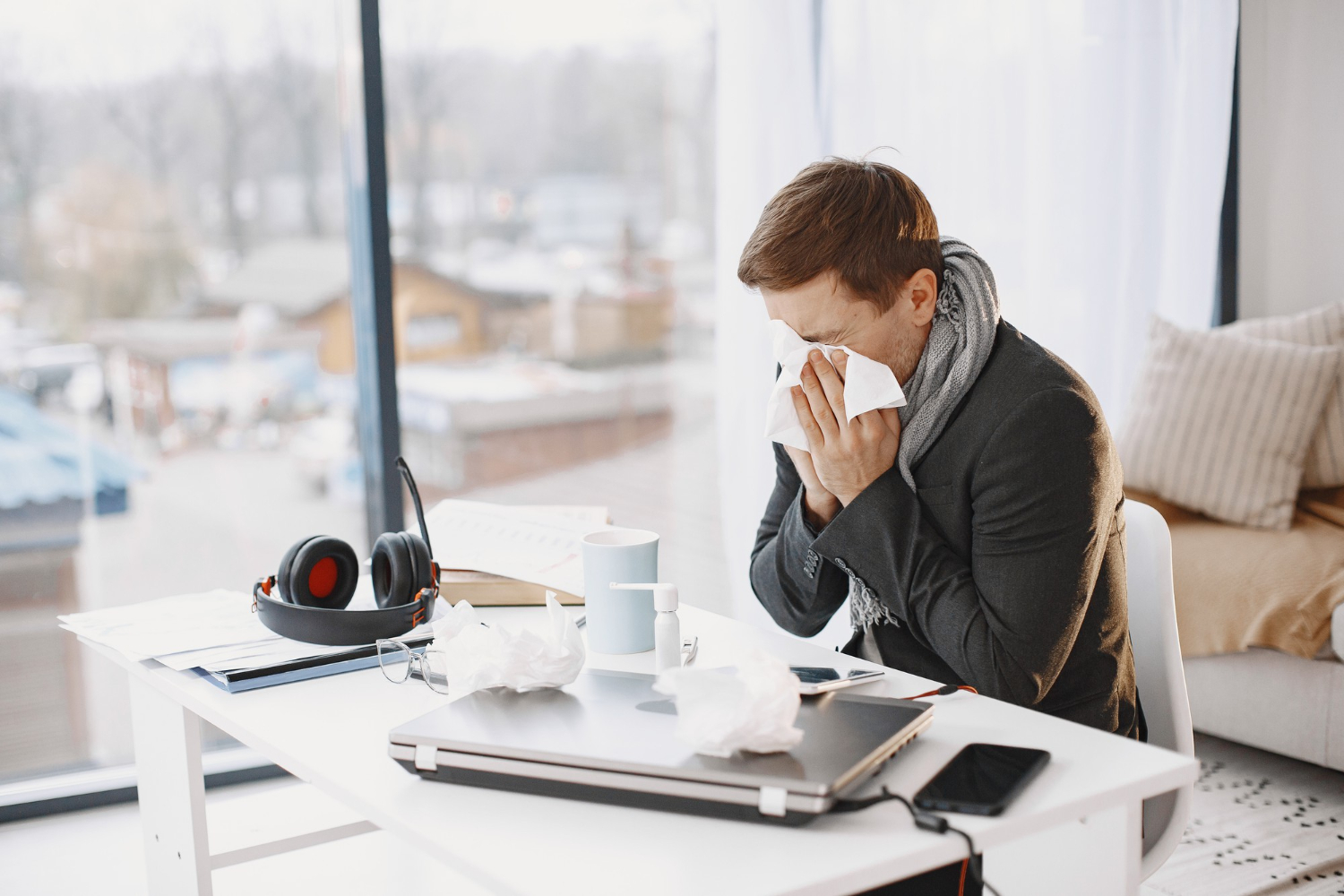Why Does Every Cosmetic Needs Testing Before Touching Your Skin?
Cosmetics touch our skin, lips, eyes, scalp, and nails every single day.

The Complete Guide to Cosmetic Testing
Safe cosmetics don’t happen by chance, they happen through testing
Download Free Guide
Most of the stores you walk into, you will see endless rows of cosmetics, creams promising glowing skin, lipsticks in shades that make you want them all, shampoos that claim to give salon-like shine, and serums that swear they surely erase years of stress.
Now, here’s the tough question. Do you ever stop and think what exactly is inside those jars and bottles before applying them to your skin?
Most of us don’t. We trust the pretty packaging, the celebrity endorsements, and the Instagram reviews. But the harsh truth is that not all cosmetics are safe just because they look appealing. And that’s exactly why cosmetic testing isn’t just important, it’s essential.
In this blog, let’s learn more about why every cosmetic should be tested before it touches your skin, what can go wrong if it isn’t, and how these tests protect you more than you realize.
Why Is Your Skin the First Line of Defense?
Your skin isn’t just the largest organ of your body, it’s also the most exposed. Every day, it protects you from dust, pollutants, bacteria, and harmful UV rays. Yet, it’s also porous, meaning whatever you apply can seep in and affect your health.
Would you ever eat food without knowing what’s in it? Then why put something untested on your skin, which absorbs up to 60% of what you apply depending on the product?
That face cream or body lotion doesn’t just sit on the surface; it can make its way inside your system. And if it contains harmful chemicals, the effects can be more than just a skin rash.
What Are the Dangers of Untested Cosmetics?
Cosmetics that aren’t properly tested can contain harmful ingredients or unsafe levels of otherwise safe substances. Let’s break down what can go wrong:
Allergic Reactions
Toxic Ingredients
Skin Damage
Systemic Effects
Eye and Lip Risks
Stories that Hit Hard
- The Lipstick Scare: In the early 2000s, investigations found that many popular lipsticks contained lead. Users had unknowingly been exposing themselves to a toxic metal every day.
- Mercury in Skin-Lightening Creams: In several parts of the world, women suffered kidney damage after using fairness creams later found to contain high mercury levels.
- Eyelash Glue Allergies: Many beauty enthusiasts developed severe eye infections from lash adhesives containing formaldehyde.
These aren’t rare cases; they are reminders of why regulations and testing exist.
What Does Cosmetic Testing Involve?
Cosmetic testing isn’t just one test, it’s a series of checks to ensure a product is safe, effective, and stable. Here are the key ones:
Cosmetics can be breeding grounds for bacteria and fungi, especially creams and lotions. Microbiological tests check if harmful microbes are present and whether preservatives are effective.
Use local testing kits or accredited labs: Ever noticed a cream separating or a lipstick melting strangely? Stability tests ensure the product stays safe and effective under different conditions, like heat, humidity, storage, and time.
This checks whether ingredients can be harmful at the levels used. Even water can be harmful in excess; toxicological testing ensures the concentration of chemicals is safe.
These are patch tests conducted under expert supervision to confirm the product doesn’t irritate or sensitize skin.
Special tests confirm cosmetics don’t contain harmful levels of heavy metals like lead, arsenic, or mercury.
The pH of a product must be skin-friendly. For example, shampoos are tested to be mild enough not to damage scalp health.
Why Regulations Alone Aren’t Enough?
Yes, countries have cosmetic safety regulations like the FDA in the U.S. or the BIS standards in India. But the sad reality is, not every product on the shelf is strictly monitored. The beauty market is flooded with small brands, counterfeit products, and imported items sold online with little oversight.
That means the responsibility partly falls on consumers too, to choose products from trusted sources and be aware of what’s inside them.
- The average woman uses 12 cosmetic products a day, exposing herself to 168 different chemicals daily.
- Men aren’t far behind, even shaving creams, deodorants, gels, and aftershaves also contain complex formulations.
- Natural claims do not always mean safe, some plant extracts can be highly irritating.
How to Be a Smart Cosmetic User?
Testing happens behind the scenes, but as a consumer, here’s how you can stay safe:
Read the Ingredients List : Don’t ignore the fine print. Watch out for parabens, phthalates, sulfates, and artificial fragrances if you are sensitive.
Do a Patch Test : Before trying a new product, apply a small amount on your wrist or behind your ear. Wait 24 hours to see if your skin reacts.
Check for Certifications : Look for quality marks, safety approvals, or dermatologically tested labels.
Avoid 100% True Claims : Miracle creams and instant results usually come at a hidden cost.
Be Careful with DIY or Imported Products : Just because a product is trending online doesn’t mean it’s safe.
What Should Be the Focus? Health or Beauty?
Cosmetics are not just about looking good; they are about feeling safe and confident. A tested cosmetic doesn’t just protect your skin; it protects your long-term health.
Think about children and teenagers, who are now increasingly using cosmetics. Their skin is more sensitive, and long-term exposure to unsafe products can have lasting consequences.
When you choose tested cosmetics, you are not only protecting yourself, you are also sending a message to the industry that safety matters.
Finally, you need to know that every swipe of lipstick, every dab of moisturizer, every pump of foundation is a tiny act of trust you place in a product. Testing ensures that this trust isn’t broken.
So the next time you are tempted by a new cosmetic launch or an online bargain, pause and ask: Has this been tested for my safety? Because your skin and your health deserve nothing less. Remember, beauty is meant to enhance your life, not compromise it. And the first step to true beauty is safety.
When it comes to ensuring safety before anything touches your skin, Equinox Labs might spring to mind, but it’s important to note that their expertise also lies in testing cosmetics. Equinox Labs is a well-established, FSSAI-approved, and NABL-accredited laboratory based in India, with over years of experience in testing food, water, and air samples across a pan-India network of advanced facilities.
With an infrastructure backed by state-of-the-art technology, they serve thousands of clients nationwide, specializing in nutritional analysis, microbial testing, environmental audits, and compliance services. Our rigorous scientific standards and accreditation set a powerful example of how meticulous testing protocols protect public health. It is significant to know why dedicated cosmetic testing in accredited labs remains vital before applying products to your skin.







